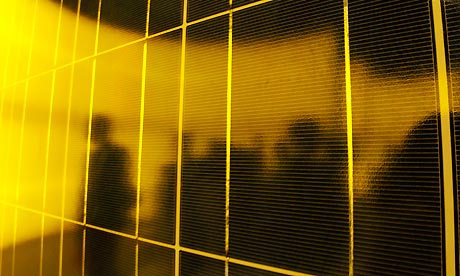Siemens pulls out of loss-making solar power business
German industrial group to concentrate renewable energy business on wind and hydroelectric power
- guardian.co.uk, Monday 22 October 2012 17.22 BST

German industrial group Siemens is pulling out of its loss-making solar power business, in the latest sign of difficulties in the renewable energy market.
The company said on Monday it would concentrate its renewable energy business on wind and hydroelectric power in a bid to increase productivity. It hopes to sell the unit and is in talks with possible buyers.
Siemens said the solar business had not been as profitable as hoped. “Due to the changed framework conditions, lower growth and strong price pressure in the solar markets, the company’s expectations for its solar energy activities have not been met.” It said the solar and hydro division generated sales “in the low triple-digit millions” in the year to September and has “roughly 800 employees”.
Growing competition from manufacturers in Asia has caused the cost of solar panels to plummet. The industry has also been hit by weaker sales and falling government subsidies. Bruce Jenkyn-Jones, managing director at Impax, an environmental investor with £1.8bn of assets under management, said: “The cost has come down dramatically. There has been an influx of capital. It’s very, very competitive; it’s only going to be the lowest-cost producers that survive in the middle of this downturn.” Various German solar manufacturers have filed for bankruptcy in the past 12 months, including QE Cells and Solar Millennium.
The news comes shortly after General Electric said a poor performance at its wind unit contributed to disappointing third-quarter results. Wind-turbine orders at the industrial conglomerate plunged because a key US subsidy for wind power is scheduled to expire at the end of the year. The chief executive, Jeff Immelt, said GE is assuming “no market” in the US for wind turbines next year without the subsidy. He expects wind revenue to drop 40% next year.
Jenkyn-Jones said: “There’s definitely a cyclical element to some of this. In the long term, renewables still look interesting.” He said policy changes with regards to renewables posed a major challenge to investors in the industry. “The most important issue for governments is to provide stable frameworks for investors to make sensible decisions.”
